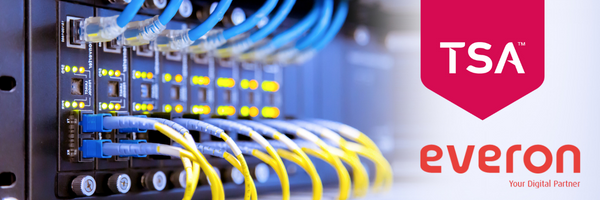In today's fast-paced digital landscape, SIM-based Technology Enabled-Care (TEC) solutions are seeing greater demand from service providers across health, housing, and social care sectors. However, misconceptions about the technology can deter your organisation from harnessing the full potential of this type of solution. In this article, we will aim to debunk 12 common misconceptions about SIM-based TEC solutions and provide clear answers to help you make an informed decision for your organisation.
Reality: A SIM-based solution offers a high level of reliability, as they are not dependent on analogue, Wi-Fi, or Bluetooth connection and have no single point of failure.
Reality: SIM-based solutions are very secure. They are cloud based and use encryption to protect your data and adhere to strict industry standards and guidelines.
Reality: With multiple network providers using a non-steered roaming sim, this type of solution offers extensive coverage. If one mobile network goes down, or is at capacity, the device can roam to another network provider offering you greater resilience.
Reality: Setting up a SIM-based TEC solution is simple. In most cases, all you need to do is insert the SIM card and turn on the device. This is timesaving and less cumbersome than most solutions that require CAT6 in-line wiring and in most cases, completed by the supplier at setup.
Reality: While initial setup and SIM costs exist, they are more cost effective than traditional wired solutions as they are often plug and play. The long-term benefits, including, initial cost savings, zero need for on-site infrastructure, simple setup, and efficiency improvements, far outweigh the capital investment.
Reality: Modern Sim-based solutions are designed to be user-friendly and can be seamlessly integrated into existing systems using open API’s.
Reality: SIM-based solutions do have good battery life. Whilst they rely on being mains powered like other systems, they do have the fallback of an emergency 24hr backup battery if the need arises.
Reality: SIM-based solutions are just that. You can choose the features and services that best meet your needs, they are fully scalable, and sustainable too, so you are future proofed.
Reality: Sim-based solutions often provide more reliable connectivity; a leading SIM provider has reported 99.9% available time over a 12-month period. When comparing these to Wi-Fi or other alternatives, where downtime can be hours/days, this is testament to how fast the GSM infrastructure is growing. Everon’s solutions offer both SIM and Wi-Fi and Ethernet connectivity which again gives commissioners flexibility around choice.
Reality: SIM-based solutions are designed to be user-friendly, so you don't have to be tech-savvy to use them. They are plug and play with push button setup for sensors making the install seamless and hassle free. They are designed with the end user in mind.
Reality: Sim-based solutions are continually evolving to adapt to emerging trends and technologies, ensuring its relevance in the future. SIM-based solutions can receive software updates over-the-air, allowing them to adapt to new technologies and security.
Reality: While SIM-based solutions are certainly useful for the senior population, they can be used by other vulnerable individuals who would benefit from the use of technology to help them live happily and independently within a safe environment.
In conclusion, Sim-based TEC solutions offer immense potential for commissioners seeking to improve connectivity, security, speed, and efficiency. Embracing this solution can empower your organisation to thrive in today's technology-driven world.
Everon uses SIM-based technology for our solution to support Health, Housing and Social Care sectors. With over a decade of experience providing digital solutions in Finland, Sweden, and the UK, we are the European market leader in digital grouped living solutions.
Our webinar ‘Ensuring Seamless Connectivity’: Strategies for Successfully Implementing SIM-Based TEC Solutions explores the advantages of SIM-based TEC solutions which can support your analogue to digital transition. We discussed strategies to address potential connectivity issues during implementation and beyond.
Additionally, the webinar included an interactive panel session where attendees posed their questions.
Click here to watch the replay.
Click here to learn about our digital solutions

For many users of technology enabled care (TEC), the ability to carry out simple activities like video calling, calling for help following a fall or having the reassurance that someone is on the other end of the line, should they need support can be life changing.
As a result, it is the responsibility of all TEC providers to ensure their customers can transition safely from analogue to digital in a timely fashion. In doing so further highlights their commitment to enable vulnerable users to live as independently as possible within a safe environment.
Disruption to lives
One of the main benefits of digital telecare solutions is their ability to provide personalised support for the elderly, individuals with disabilities, and those with learning difficulties.
Not transitioning safely from analogue to digital poses a risk for all users of these services. For instance, analogue equipment which has not transitioned to digital is less likely to provide 100% reliability and could lead to increasing alarm call failures. This could be life threatening for some users.
Analogue equipment will also see the added challenge of maintenance issues as this equipment will be phased out during the coming years.
The Do’s
Check Reliability
First and foremost, choose a supplier with a track record of delivering high-quality solutions consistently. This will help to ensure that you receive reliable, scalable, and future-proofed digital solutions that meet your unique needs.
The TSA’s recommendation is that all organisations “that supply TEC to their customers should be certified by TEC Quality according to the Quality Standards Framework (QSF)”. To this end, whatever supplier you choose, check that they are committed to high quality and safe services.
Investigate Interoperability
Interoperability continues to be a key aspect of the digital switchover. It is essential to prioritise solutions that are interoperable and can work with other digital systems seamlessly. This will help to ensure that you can integrate your new digital solutions into your existing infrastructure with ease.
In 2021 Everon partnered with national charity Hft. It was important for their support team to have a solution that complimented their existing technology. We were able to personalise our solution to support and enable the individuals to personally develop and learn new tasks.
Just as in the example above, be clear on the level of interoperability you require and check that the supplier you choose can meet your requirements.
Supplier Customer Care
A key aspect of the analogue to digital transition is customer care. It’s crucial to choose suppliers who will prioritise customer care pre and post the digital switchover. This will help to ensure that you receive the support you need during the transition process and beyond.
Communication
With a lot of uncertainty surrounding the digital switchover and how people’s lives may be impacted, communicate regularly with your service users. Keeping them informed through the process will increase their peace of mind.

The Don’ts
Purchase Analogue Systems
By September 2023, Openreach will stop selling analogue phone lines to new customers. As a provider, it is expedient to discontinue the purchase of analogue equipment and channel funds into the purchase of fully digital solutions that are futureproofed and provide value for money. Or in the short to midterm, purchase hybrid solutions whilst a timescale for transition to fully digital solutions can be drawn up.
Defer Key Decisions
A growing concern within the sector is the real risk that many Local Authorities, Housing Associations and Service Providers have left preparations to transition from analogue to digital too late; as a result, increasing the risk to service users.
If you’re yet to take key steps in your analogue to digital transition, the next best time to act is now.
Transitioning from analogue to digital can be a daunting prospect for TEC providers and their service users. However, it's a necessary step to ensure that vulnerable users receive the care they need. With the right supplier, the process can be straightforward and cost-effective.
How can Everon help with your analogue to digital transition?
Everon is the European market leader in digital grouped living solutions. We have a track record of providing digital solutions since 2007 across the Nordics and more recently grouped living and care organisations in the UK. We’re committed to high quality and safe services. As a result, we have been successfully awarded the TSA Quality Standards Framework (QSF) status for the second year running.
Our flexible, wireless, open platform provides personalised solutions that are future-proofed. We continue to build on our experience and excellence by investing heavily in research and development. Our solutions are tried and tested across 70,000+ clients pa.
To find out more about how we can help you transition from analogue to digital technology, visit our website and read the case study.
Frequently Asked Questions (FAQs)
Q: Why is it important to transition from analogue to digital?
A: The transition from analogue to digital is important because analogue technology is becoming outdated, and digital technology offers more benefits, such as increased
reliability, better quality, and greater flexibility. Digital technology also allows for more efficient and cost-effective care, which can benefit both service providers and users.
Q: What challenges can arise during the analogue to digital transition?
A: Some challenges that can arise during the transition include equipment compatibility issues, lack of technical expertise, difficulties in finding reliable suppliers. It's important to address these challenges proactively to ensure a smooth and safe transition.
Q: How can I ensure a safe transition from analogue to digital?
A: Some important steps to ensure a safe transition include choosing a reliable supplier, ensuring interoperability, prioritising customer care, and providing regular communication with service users.
Read the Case Study, here
Find out more about our solutions here